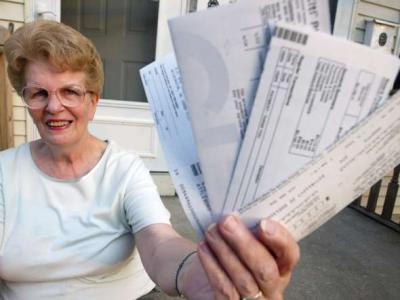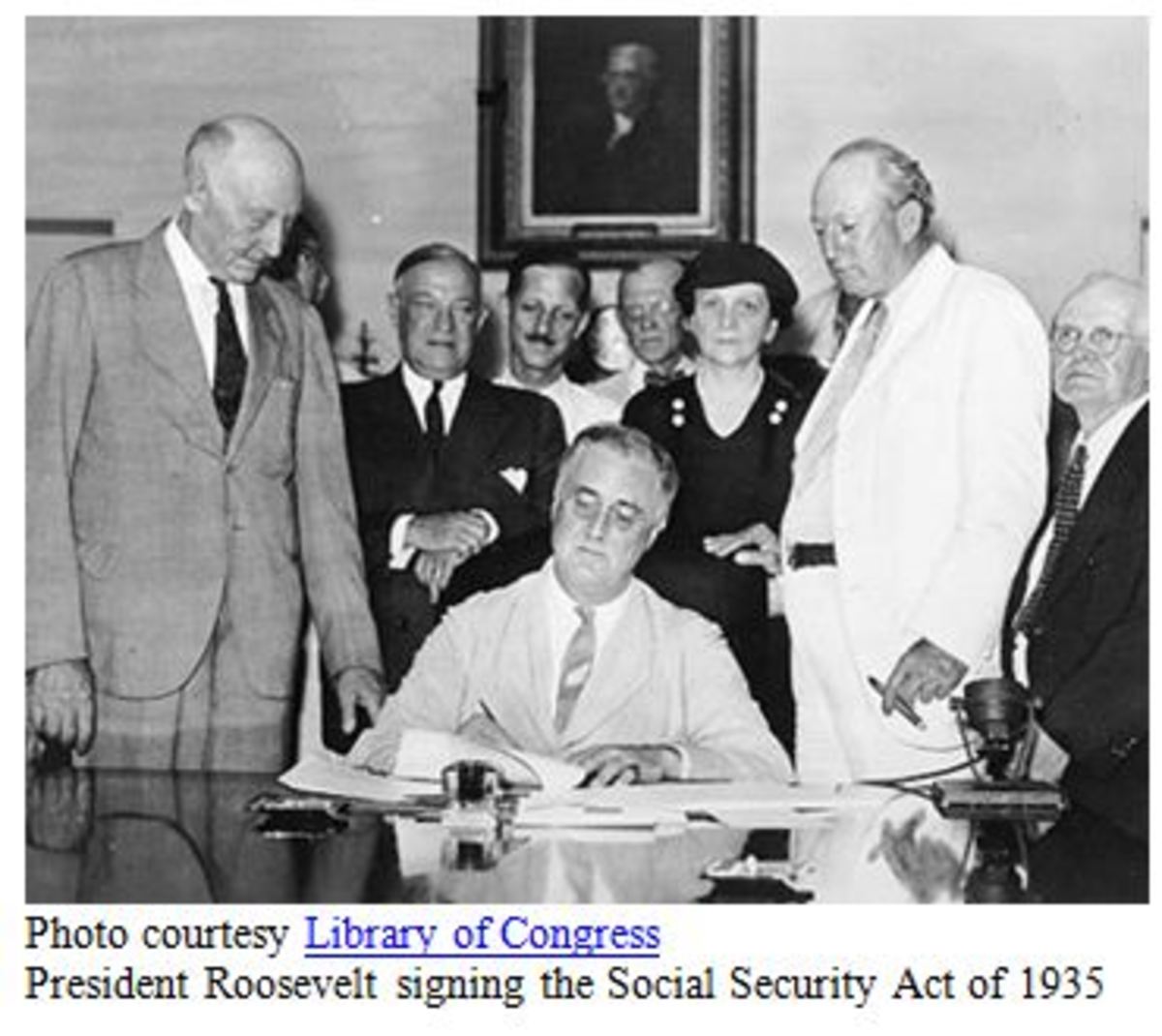Middle Aged Americans Are Losing Their Quality Of Life

My friend called to chat the other day. She's not someone to get up at arms about politics or much of anything else, for that matter. TT is one of those people who turn the news station on upon waking, watching while she enjoys her first cup of coffee for the day. Certainly, there are issues that she doesn't agree with and those she feels are downright ridiculous, but she rarely has much time to do more than vote for the candidate she hopes will do the best job.
There's a real reason why she's so busy these days. A dozen years ago, she finally was able to realize her dream of owning her own home. After years of struggling as a single mother, dealing with falling through the cracks because she earned too much to receive any kind of financial or medical help, but unable to easily provide for her son, she had reached a point in her career where living didn't require her to work two full time jobs.
She earned enough to be able to afford the mortgage that wasn't much more than she had been paying in monthly rent. The benefits package at her job included affordable medical insurance with a low yearly deductible of only $250.00. Her home was heated by oil, but the costs were at an all time low, and had lingered there for several years. Instead of holding on to the few ancient appliances she owned, she opted to use her credit cards to purchase newer energy efficient replacements, believing it would be better in the long run, considering that electric wasn't as cheap as it had once been.
She was employed as a general manager of a restaurant. The pay was pretty decent, the benefits fair, and the employer a joy to work for. Sometimes the hours were longer than expected, but that was the cost of having an economy so good that there were more jobs than applicants to fill them.
And then it happened. All hell broke loose. America was “under attack” and the results of those twin towers falling had far reaching consequences. Insurance costs tripled, not only for business owners, but also the home owners and for individual medical insurance premiums. The plan originally purchased was no longer available. The cheapest one to replace it cost an additional $40 a week, and the yearly deductible was $2,000 for her and her son. In addition, she now had a $20 co-pay for every visit, even the preventative care appointments. Dental coverage was no more, and eye coverage had changed to only covering one exam every two years.
The owner of the restaurant decided to sell out. The ever rising insurance and energy costs were more than he wished to deal with. The new owners came with their own agenda. They now required TT to work an additional 10 hours a week for the same salary and she couldn't hope for an increase in pay for at least another two years. They felt she earned too much money for her position. Their insurance plan wasn't even half as good as the one she had been forced to take as a replacement after 9/11.
Personal costs were also rising. Oil for heating her home had almost doubled. The cost of electric and telephone services had also shot up. New trash collection policies in her home town had increased to more than twice what she had been paying. The cost of car insurance had risen. The cost of gas had doubled. She could no longer afford to travel the distance to her job and still maintain her home.
She began to look for another job, closer to home, in the hopes of reducing car and travel expenses. But it seemed that no one wanted to pay an amount that was much more than a couple of dollars over minimum wage. There were too many younger applicants able to do the job for less. These kids lived at home with their parents. They didn't have the expenses of a household...nor did they have 25+ years experience.

Eventually she took a job in another industry as a convenience store manager. The pay was less than she had been earning, but the money saved in travel would make up the difference. She came to like it there, though the small salary increases were doing little to keep up with inflation. She watched worriedly as her tiny savings were slowly dwindling away.
In the midst of this, new laws were put into effect which allowed credit card companies to change their interest rates. She had been steadily working to bring her balances down, to pay off the cards, careful not to add new purchases unnecessarily. But when the hot water heater goes, the credit card is the only answer. It wasn't something to worry too much over when she made the decisions. She was always careful not to exceed what she could pay monthly.
Unfortunately, the consumer is never taken into consideration when corporations are angling to squeeze more money out of them. The laws passed removed interest rate restrictions. Cards she had maintained for years with interest rates of 14 and 16% were suddenly raised to 21 and 23%. The minimum monthly payments ballooned to amounts she couldn't cover.
Within the next five years, oil reached an all time high, so that she often had to keep her heat down to 58 degrees just to make it last until she could scrape together enough money to purchase more. School and property taxes were raised twice during that same five years. Because her insurance and taxes were escrowed into her mortgage payment, her payment had increased 26%.
She realized she was back at the beginning. She needed to get a second job if she was to survive. However, she was working in a position that required her to be available for any crisis. She had to be very careful how she was going to work a second job without jeopardizing her main one. After 2 grueling years of working 10 hours at one job and another 4-5 at a second one, the policies of her first employer changed. With the changes, she could no longer work two jobs.
She couldn't afford the loss of the second job. The only answer was to find yet another job. But the economy had gotten really bad by this time. She was forced to take a job that paid more than a third less than her other position. By working 40 hours at both jobs, she was now able to achieve the same income as before. In other words, she was now working 80 hours a week to earn the same as she had by only working 65. And going back another 10 years, she was making the same amount as she had been making working only 50 hours. Except now, that same amount doesn't buy near what it used to buy.
She has thought about selling her home, but it isn't really a wise thing to do at this time. She would only receive maybe half of the value with the housing market in its current state. There are many cosmetic repairs that would need to be made, but she can't afford to make them, what with needing to pay the constantly rising taxes. The cost of renting an apartment is roughly $100 a month more than her mortgage and she would still be required to pay for utilities and heat.
TT will be observing her 55th birthday in less than 5 months. Up until a few years ago, she would have been looking forward to completing another 10 years of employment, comfortable in knowing she had secured a home for her old age and a modest savings account to help ward off expenses. Her retirement account wouldn't have afforded her the luxury of taking European tours, but it would have covered living expenses.
Now she looks at the future with resignation. She has come to terms with the idea that she will be required to work 2 jobs until she dies. She has resigned herself to knowing she will probably die before she is able to enjoy the company of future grandchildren, because no one can work morning to night indefinitely without it taking a toll on their health.
TT is not alone. I look around at my various friends and acquaintances and see them all headed down the same path. There are over 120 empty homes in my town. They are empty because people could not afford to continue paying for them. They are empty because whole families had to move home with elderly parents due to the fact that the mortgage payment could not be paid if they also had to pay for the utilities. Those families are paying for a home they can not afford to live inside, holding on in the hopes that one day they will either be able to sell without a huge loss, or to actually live there.
When TT called the other day, she passed on some unwelcome news. Apparently the healthcare coverage offered at her place of employment had changed. She was told the changes had come about because of the national healthcare reform. She laughed when she informed me that she could now put her 25 year old college student son on her insurance, except for the fact that she can't afford it. She also told me about a few situations going on with her co-workers.
Several of her co-workers are married, and have their husbands on their insurance under a family plan. With the new laws in effect, the husbands must now be dropped from the insurance plan if insurance is offered at their places of employment. These woman chose the insurance plans at their work because they were better plans for the money paid. Now, they will have to bear the burden of carrying two insurance plans which will increase their coverage costs. Most family plans are a flat rate to include a husband and children. There are no reductions for not having a husband on the plan. So it appears that families will now be required to lay out at least a third more money to cover those not permitted to be enrolled on their spouse's plan.
I immediately thought of my daughter and her husband. His family plan was costing them almost $400 a month. My son-in-law suffered a major medical crisis that required two weeks of hospitalization and an additional month off work. My daughter was finishing up her degree in the healthcare industry, at the time, and wasn't employed. After struggling to get finances caught up, they made the decision to drop the insurance. It was a luxury they couldn't afford and still provide clothes and shelter for their children.
A year later, my daughter's employment made her eligible for a terrific insurance plan that was very affordable. Being in the healthcare industry, the insurance provided is one of the very best. Now it looks as though they will be back to square one. Her husband will be forced to purchase insurance that isn't nearly as good for twice the money. And the real kicker is that no one can simply refuse to buy insurance. We'll be fined.
Apparently, paying for insurance takes priority over buying groceries or providing shelter. I guess we can look at it this way: if we get sick and weak from the effects of starvation and exposure, when we are admitted to the hospital for treatment we won't have to be wracked with guilt over our inability to pay.
If you found this information helpful, please pass it on by clicking the Tweet, Like, or +1 button provided at the top of the page.
- The Dismantling of American Liberties - Act I
Part 1 of a three part series aimed at explaining how we arrived at our loss of liberties through deception, manipulation, and greed. The dismantling of our American liberties began in ernest with the inception of the CIA in 1947 and has continued on - The New World Order: Not Just Another Conspiracy Theory
The subject of a New World Order has been a recurring theme since the Senior President Bush took office. This article explores the background and foundations of the idea known as the New World Order. - Has The Socialist Agenda Taken Over Our Schools?
John Dewey and William Kilpatrick were strong advocates for changing the way American students were taught. Did changes in methodology and content beginning in the 1920's contribute to a nation full of under educated graduates? Have so called new met - Are Your District's Teachers Worth Their Salaries?
A look at the workload vs payscales of teachers of the 1970's compared to the present. Commentary on the extreme decrease in workload but exceedingly high salaries of the teachers of today. Link included for researching the salary and education level








